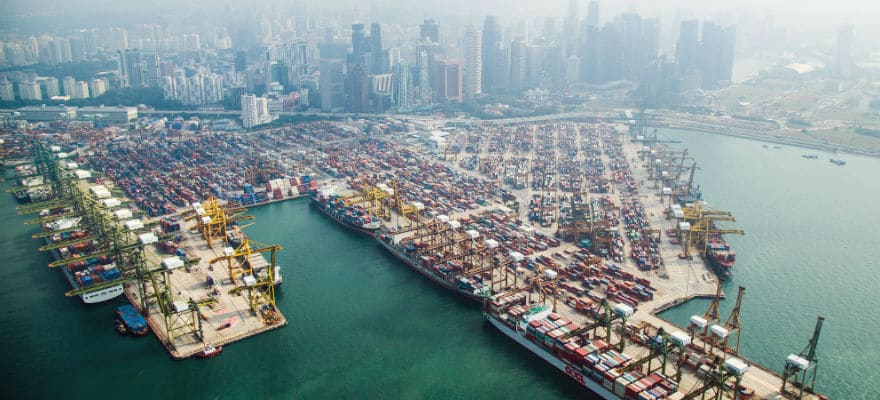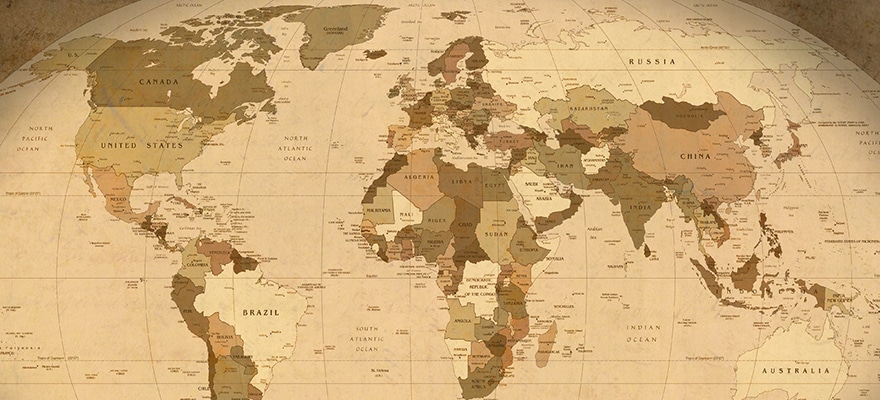This guest article was written by William Laraque who is the Managing Director of US-International Trade Services.
Global banks
Banco Intesa Sanpaolo's innovative use of Bolero to conduct a large commodity trade is representative of the great disconnect that exists in global trade today.
On the one hand global banks are increasingly withdrawing from the 'classical' international trade markets. Barclays' retreat from African markets is symptomatic of this trend. HSBC, which had branches in 89 countries when I worked there at the turn of the 21st century, has pulled in its global deployment tentacles as another example of the global bank retrenchment.
Ample reasons including increased regulation, the intensification of political and commercial risk in certain parts of the world and primarily the difficulty in making a profit, all contributed to this cross-border retrenchment of banks.
Opposed to the withdrawal of banks from certain foreign markets is not the Bolero, BPO and Blockchain -led reassertion of large commercial banks in global markets. These episodic initiatives mainly involve large banks aiding the trade, the mostly large commodity transactions of large, multinational corporations. While these goliathan transactions are ballyhooed by a relatively few banks as innovative breakthroughs, the Daniel-like innovations of a more democratic, diffusive nature have started to rampage.
Led by e-commerce platform providers out of Asia and the US, those emanations serve the entrepreneur and SME who have broken out of their national markets and are increasingly going cross-border. These global trade pioneers take advantage of internet innovations in communications, in credit-worthiness determination, in sales, marketing, buying and Payments made possible by the internet. Some of them are Alibaba Holdings Group, WeChat and Tencent in China, Amazon, Walmart in the US, Lazada in Singapore, SnapDeal and Flipkart in India and Lioni out of Mexico.
Due mainly to superb logistics, what Jack Ma calls the logistics miracle, Alibaba and Tencent succeeded in China where Amazon failed to compete and reverted to spending some $5 billion in India in its global demarche.
E-commerce
Here are some of the representative successes of this e-commerce cross-border commercial and financial assault and what will have to be done to ensure success in varied markets, each with its cultural idiosyncrasies and differing protocols and logistical constraints:
While major international banks are withdrawing from global, cross-border trade markets, the role of such online financial platforms as Tencent's WeChat and Ant Financial's Alipay assume an outsized dimension.
Ant Financial runs Alipay, a payment platform.
Alibaba has been able to deploy throughout China. It entered India's e-commerce space with a 25% stake in Paytm owner One97. Launched in 2010, AliExpress.com is an online retail service made up of mostly small Chinese businesses offering products to international online buyers. It is the most visited e-commerce website in Russia.
Alibaba Group announced that it intended to acquire a controlling interest in Lazada by paying $500 million for new shares and buying $500 million worth of shares from existing investors. Lazada Group is a Singaporean e-commerce company founded by Rocket Internet in 2011. Lazada operates sites in Indonesia, Malaysia, the Philippines, Singapore, Thailand, and Vietnam.
Ant Financial Services Group, the financial-services affiliate of online shopping giant Alibaba Group Holding Ltd., is joining with France’s Ingenico Group SA to push its mobile payment.
Alibaba's e-commerce efficacy was demonstrated when Macy's and Costco agreed to use TMall, one of Alibaba's online platforms, to sell goods to Chinese shoppers. Use of Alibaba's bonded warehouses in China's free trade zones provide the logistical and tax justifications for this move.
Online platforms
Here then are some of Alibaba's online platforms:
Cainiao - is a consortium which runs the digital platforms of more than a dozen logistics providers, 1800 distribution centers and 100,000 dispatch points.
Yonghui- so called O2O or online to offline, provides the customer the ability to shop and pay online while collecting goods at a brick and mortar facility or having goods delivered at home.
Suning - will open online electronics gadget and appliance stores with TMall while Cainiao promises delivery in as little as two hours.
Ant Financial - coordinates all Alibaba Group financial initiatives, has provided 400 billion yuan in micro loans. Ant has a default rate of < 2%, is going public and has an expected market cap of $50 billion.
Alipay - Alibaba's successful payments by escrow system, processes 120 million transactions per day.
Sesame - Alibaba's credit scoring system.
Alimana - Alibaba's online marketing service.
Unilever - in a June 2015 deal, decided to use Alibaba's marketing services for China, after its sales in China fell by 20% during the last quarter of 2014.
WeChat supports payment and money transfer, which allows their users to peer-to-peer transfer and electronic bill payment.
Every WeChat user has their own WeChat Payment account. The beginning balance is nil for all new users, the currency of the balance is in CNY. Users can acquire balance by linking their WeChat account to their debit card, or by receiving money from other users. Users who link their credit card can only make payments to vendors, it cannot be used to top up a WeChat balance.
Many stores in China (including Hong Kong, Macau, Taiwan) accept WeChat Payment as a payment option. This includes online payments, mini markets, supermarkets, shops, vending machines, metro, and so on and so forth.
In Chinese tradition, a red envelope is given to relatives and friends as a way of congratulating them or a way of greeting on certain big holidays like the Chinese New Year. Ever since WeChat introduced 'Electronic Red Envelope' in 2014, it has changed the way people give red envelopes in China.
In addition to China, the payment service is offered in parts of Southeast Asia, Europe, North America and Oceania. WeChat Payment also competes with Alipay. WeChat allows users to tip their favourite posts as well. As of March 2016, WeChat Payment has over 300 million users worldwide. In April 2016, WeChat invested RMB 100 million in accelerating market expansion.
Amazon
Amazon's cloud business, Amazon Web Services, continues to drive the company's growth. AWS is the most profitable business for Amazon, bringing in $861 million in operating income, more than double last year's $428 million, at a solid 26% margin. The 55% year-over-year revenue growth is the largest ever.
The Global Trade e-commerce platform and what needs to be done
The Chinese and US global trade e-commerce platforms are not without their flaws. Alibaba has abetted the use of its platform by Chinese manufacturers to sell counterfeit goods globally. Its financial affiliate, Ant Financial, has one of the most intrusive credit-worthiness determination systems anywhere. As these platforms go cross-border, matters of privacy and cybersecurity take on an outsized dimension.
Amazon has failed in China and has withdrawn to India. All markets have differing logistical, payment and other characteristics. There are some 33 support services that must be provided in a truly multi-functional, global e-commerce platform in order to provide the customer with excellence in service. Alibaba, Amazon, Walmart, Lazada and others are learning this reality as they expand.
The salient fact is that while large banks were sleeping and otherwise spending time and resources on BPO, Bolero, Blockchain and other initiatives, cross-border e-commerce platforms ate their proverbial lunch.






















